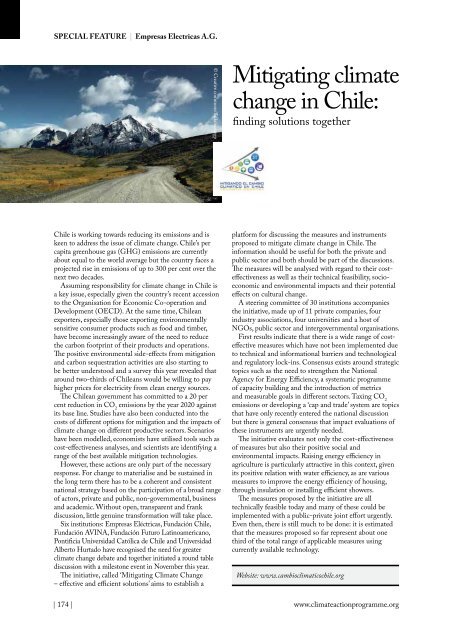Climate Action 2010-2011
Create successful ePaper yourself
Turn your PDF publications into a flip-book with our unique Google optimized e-Paper software.
SPECIAL FEATURE | Empresas Electricas A.G.<br />
© Creative commons/flickr/cesargp<br />
Mitigating climate<br />
change in Chile:<br />
finding solutions together<br />
Chile is working towards reducing its emissions and is<br />
keen to address the issue of climate change. Chile’s per<br />
capita greenhouse gas (GHG) emissions are currently<br />
about equal to the world average but the country faces a<br />
projected rise in emissions of up to 300 per cent over the<br />
next two decades.<br />
Assuming responsibility for climate change in Chile is<br />
a key issue, especially given the country’s recent accession<br />
to the Organisation for Economic Co-operation and<br />
Development (OECD). At the same time, Chilean<br />
exporters, especially those exporting environmentally<br />
sensitive consumer products such as food and timber,<br />
have become increasingly aware of the need to reduce<br />
the carbon footprint of their products and operations.<br />
The positive environmental side-effects from mitigation<br />
and carbon sequestration activities are also starting to<br />
be better understood and a survey this year revealed that<br />
around two-thirds of Chileans would be willing to pay<br />
higher prices for electricity from clean energy sources.<br />
The Chilean government has committed to a 20 per<br />
cent reduction in CO 2<br />
emissions by the year 2020 against<br />
its base line. Studies have also been conducted into the<br />
costs of different options for mitigation and the impacts of<br />
climate change on different productive sectors. Scenarios<br />
have been modelled, economists have utilised tools such as<br />
cost-effectiveness analyses, and scientists are identifying a<br />
range of the best available mitigation technologies.<br />
However, these actions are only part of the necessary<br />
response. For change to materialise and be sustained in<br />
the long term there has to be a coherent and consistent<br />
national strategy based on the participation of a broad range<br />
of actors, private and public, non-governmental, business<br />
and academic. Without open, transparent and frank<br />
discussion, little genuine transformation will take place.<br />
Six institutions: Empresas Eléctricas, Fundación Chile,<br />
Fundación AVINA, Fundación Futuro Latinoamericano,<br />
Pontificia Universidad Católica de Chile and Universidad<br />
Alberto Hurtado have recognised the need for greater<br />
climate change debate and together initiated a round table<br />
discussion with a milestone event in November this year.<br />
The initiative, called ‘Mitigating <strong>Climate</strong> Change<br />
– effective and efficient solutions’ aims to establish a<br />
| 174 |<br />
platform for discussing the measures and instruments<br />
proposed to mitigate climate change in Chile. The<br />
information should be useful for both the private and<br />
public sector and both should be part of the discussions.<br />
The measures will be analysed with regard to their costeffectiveness<br />
as well as their technical feasibility, socioeconomic<br />
and environmental impacts and their potential<br />
effects on cultural change.<br />
A steering committee of 30 institutions accompanies<br />
the initiative, made up of 11 private companies, four<br />
industry associations, four universities and a host of<br />
NGOs, public sector and intergovernmental organisations.<br />
First results indicate that there is a wide range of costeffective<br />
measures which have not been implemented due<br />
to technical and informational barriers and technological<br />
and regulatory lock-ins. Consensus exists around strategic<br />
topics such as the need to strengthen the National<br />
Agency for Energy Efficiency, a systematic programme<br />
of capacity building and the introduction of metrics<br />
and measurable goals in different sectors. Taxing CO 2<br />
emissions or developing a ‘cap and trade’ system are topics<br />
that have only recently entered the national discussion<br />
but there is general consensus that impact evaluations of<br />
these instruments are urgently needed.<br />
The initiative evaluates not only the cost-effectiveness<br />
of measures but also their positive social and<br />
environmental impacts. Raising energy efficiency in<br />
agriculture is particularly attractive in this context, given<br />
its positive relation with water efficiency, as are various<br />
measures to improve the energy efficiency of housing,<br />
through insulation or installing efficient showers.<br />
The measures proposed by the initiative are all<br />
technically feasible today and many of these could be<br />
implemented with a public-private joint effort urgently.<br />
Even then, there is still much to be done: it is estimated<br />
that the measures proposed so far represent about one<br />
third of the total range of applicable measures using<br />
currently available technology.<br />
Website: www.cambioclimaticochile.org<br />
www.climateactionprogramme.org












